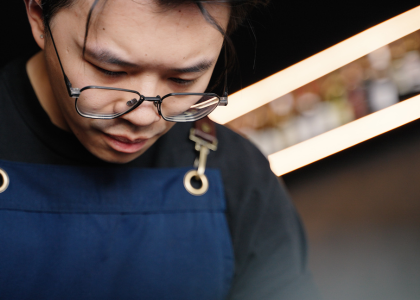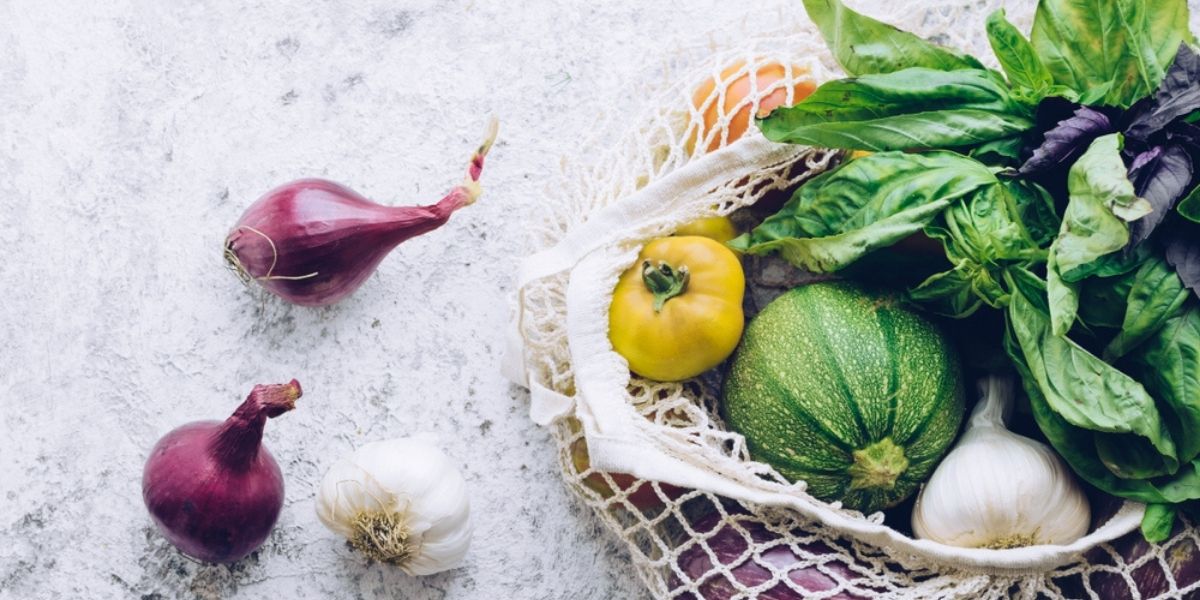
Alumni Video Series: Meet Simon Ming
This month we get to know Simon Ming who studied an Advanced Diploma of Hospitality Management (Cuisine). Simon is now the proud owner and chef at ODÉ Bistro in ...

It's only one meal of leftovers in the bin.
-You, and 8.3 million Australian households, every week.
Reducing food waste: where do you begin? There is an overwhelming amount of information available and sustainability can easily be seen as ideal, but not practical. However, the more that each of us take small steps towards improving our food preparation habits and perception towards food waste, the bigger the difference we can all make for humanity, the environment, and the planet.
The United Nations is a leader in promoting sustainable transformations for our future, inviting us all to recognise September 29 as the International Day of Awareness of Food Loss and Waste.
As the reduction of food waste often begins in our very own kitchens, we asked the chefs of Le Cordon Bleu Melbourne to share some simple steps we can take towards practicing conscious meal preparation.
Here are some top tips from Le Cordon Bleu Melbourne chefs on how to minimise food waste:
When planning your meals and creating a shopping list, check what ingredients you already have in your fridge and pantry and how you can use them as a base to construct your meals. Not only does planning save you money, but it is the first step towards minimising or using up single-use items which may expire or be thrown out before you have a chance to use them.
Chef Nancy Kaur-Kittelty believes “meal planning doesn’t have to be elaborate. Even planning a day or two ahead is all the plan you need”.
Try to only buy what you need for each recipe, especially if you enjoy fresh ingredients or like to mix up your meals each night for variety. Although in some cases it may be cheaper per kilo to buy an ingredient in bulk, it is more sustainable and can actually work out cheaper to simply buy what you need. It is the difference between buying a whole bag of spinach, where half of it deteriorates in the fridge all week, vs buying a smaller amount of spinach picked from the loose-leaf bin which you will actually use up in time. Buying less frequently also reduces the quantity of ingredients in your fridge all going off by the end of the week and gives you the opportunity to empty your fridge before each shop.
Chef Nancy adds, “Woolies Click & Collect [Woolworths supermarket’s grocery delivery option] is fabulous as you only need to shop $30 worth of groceries online with no extra charges and your order is ready to be collected from the store front. So you can buy less groceries more frequently and be mindful of your time too.”
Most of us can’t start the day without a cup of coffee. According to Chef Steffen Jensen, worms may appreciate caffeine just as much as we do:
“Save your old and used coffee grains - it’s an excellent fertiliser when growing your own vegetables! Coffee is very rich in potassium, nitrogen and has a high acid content, so use a 50:50 ratio mixed with normal compost. Worms seem to love the caffeine, but slugs don’t like it at all, which makes it excellent for growing your own organic vegetables. It works especially well when growing tomatoes and root vegetables.”
It may be easy to buy a packaged bunch of snipped herbs from your local supermarket. But generally, recipes only require a few leaves or sprigs; meaning at least 50% of the bunch you’ve purchased gets thrown away. If you only need herbs for the occasional single-use recipe, you can reduce food waste by growing your own herbs. Just snip a small amount from the plant each time you need them and you can use the plant for years to come, or even find extra uses for the herbs in your cooking or day to day life.
With so many herb growing kits available today, growing your own herbs requires very little time, space and maintenance with a positive impact on your financial savings, the environment and not to mention; adds a fresh and personally-grown touch to your meals!
Composting may seem like a method only for those with ‘green thumb’ or a farm. Chef Nancy, however, has shared her composting hack that is so easy, you will be surprised you never thought of it!
“I compost my kitchen waste through my council’s green bin. That’s right – the garden waste bin is not only for lawn clippings!” she said.
Next time you are chopping and peeling vegetables for a dish, simply transfer the small collection of peel, cores, seeds, food scraps, etc. into the organic waste bin. This even counts for teabags, coffee grounds, egg cartons, paper towels and other paper items (such as muffin pans or compostable coffee cups) from the kitchen.
Better yet, some Australian councils offer benefits such as rebates, free compost bags, free kitchen caddies, and other initiatives in support of composting and environmentally sustainable habits. Contact your local council for further information.
If you can’t beat the expiry date, try a method to make your food last longer! Learning how to correctly store your perishable foods will extend their freshness and give you an extra few days to use them up, rather than wasting produce. Making use of your freezer is also a great way to help your foods last longer. Bread, vegetables, fruits and even some dairy products can be frozen for months.
Preserving and fermentation is another healthy and traditional approach to storing vegetables, utilising milk and grains, or creating sauerkraut or kimchi from excess ingredients. You can also use a dehydrator to get creative with ingredients which may otherwise be thrown out – dehydrated beans can be ground into a protein powder, bacon can be seasoned and dried into a jerky, or potato peels can become homemade healthy chips.
Learn The Art of Fermentation with Le Cordon Bleu Online Learning
If your workplace would like to implement some sustainable initiatives around food waste, Chef Peter Little John suggests partnering with your local community or an organisation which collects leftover food.
“In Vietnam, the hotel [where I worked] would send the leftover, not eaten or ‘spoiled’ (dried/limp) fruits and vegetables from the guest buffets to the local chicken farm. The farm would then send eggs to us, which would then be donated to the local orphanage. We would send a couple to staff to cook the eggs for the children a couple of mornings a week. The local pig farms were invited to collect any other food waste they wanted. This saved us filling bins which cost to be emptied and taken away, plus also spreading goodwill.”
Copyright © 2025 Le Cordon Bleu International B.V. All Rights Reserved.